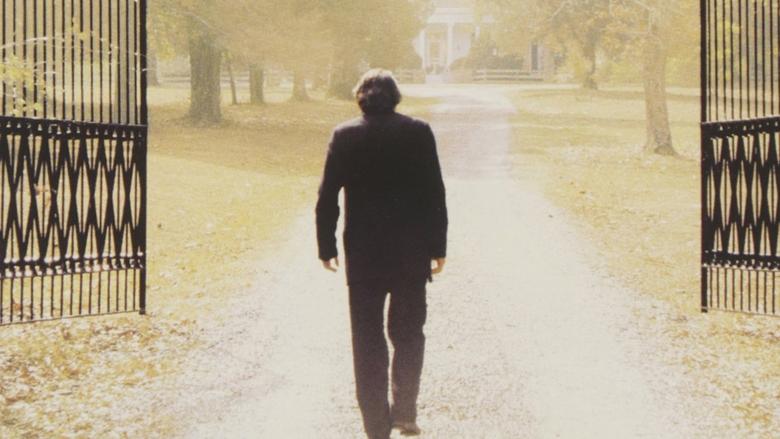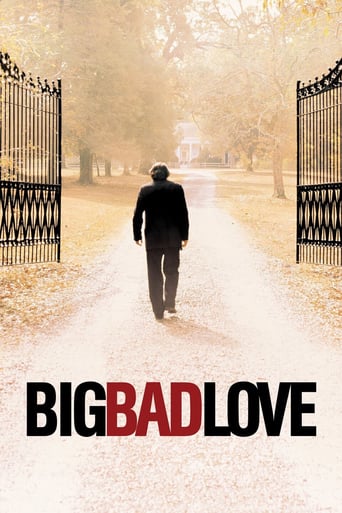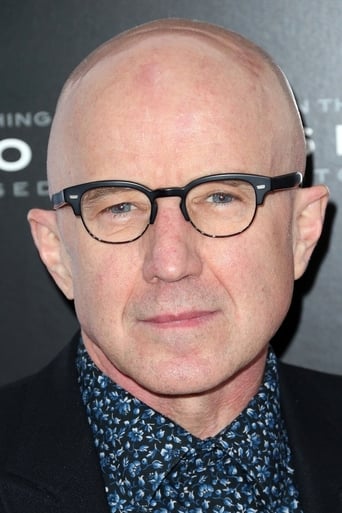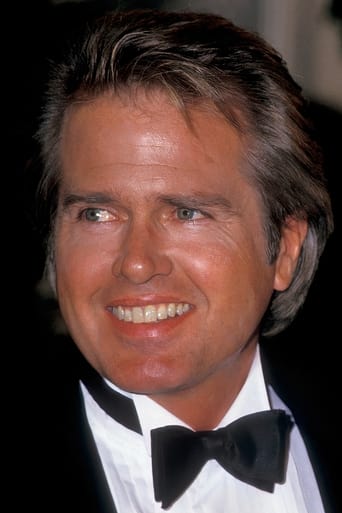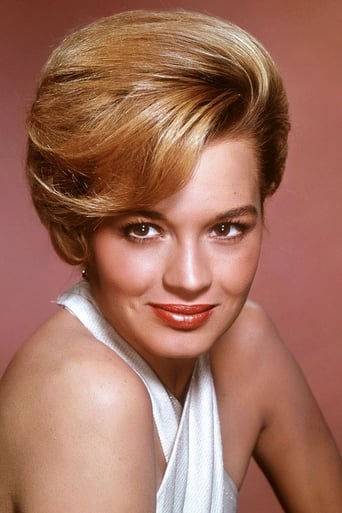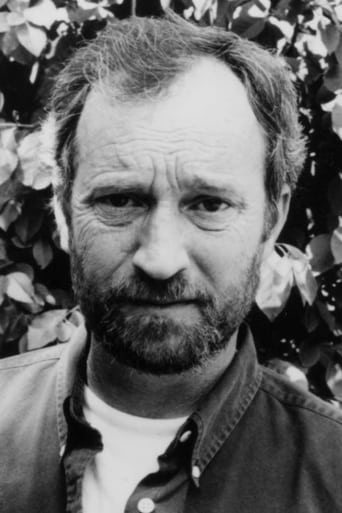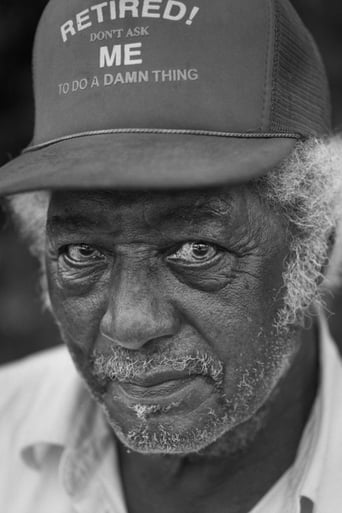Vietnam veteran Leon Barlow is struggling as a writer, and his personal life isn't much better. His unsympathetic ex-wife Marilyn doesn't approve of his visits with his two children, and he has problems with alcohol. Yet even when Leon manages to catch up on alimony and child support payments, things in his life seem to decline further, until a sudden tragedy catches him off guard.
Reviews
Too much of everything
Purely Joyful Movie!
One of my all time favorites.
This is one of the few movies I've ever seen where the whole audience broke into spontaneous, loud applause a third of the way in.
I enjoyed this movie, not for what Howard and Winger left in from the original literary fiction of Larry Brown, but for what they brought to the story. Winger and Howard are big fans of Brown and the adaptation is brilliant in sections. If this film put you to sleep, it's because you were never awake.The film version of Big Bad Love is based not on the entire collection of short stories in the book of the same title, but only on the novella that ends the collection titled 92 Days. It follows the exploits of an aspiring writer named Leon Barlow and the people that surround him for a period of ninety two days. And the screenwriter/director Arliss Howard chose to interpret the world of Barlow by presenting portions of the original fiction through the use of non-Diegetic sound. The distinction between diegetic or non-diegetic sound depends on our understanding of the conventions of film viewing and listening. Certain sounds are represented as coming from the story world, while others are represented as coming from outside the space of the story events. Diegetic sound is any sound presented as originated from a source within the films world. That is, sound whose source is visible on the screen or whose source is implied to be present by the action of the film include voices of characters, sounds made by objects in the story and music represented as coming from instruments in the story space. Non-diegetic sound is represented as coming from a source outside story space. Sound whose source is neither visible on the screen nor has been implied to be present in the action such as narrator's commentary, sound effects which is added for the dramatic effect and mood music. A film with diegetic and non-diegetic conventions can be used to create ambiguity or to surprise the audience. This allows the writer/director to present the real world of the writer and what occurs in his mind as simultaneous events.The particular scene in the movie Big Bad Love is called "Rejection Letter Blues" and involves Barlow arriving home from a long day of work painting houses and reading the multiple rejection letters for his novel. Barlow drinks as he does this and the audience hears the voices in Barlow's head reading the rejection letters. The voices are initially in English, but quickly move to Spanish to French to Arabic and so many languages finally overlapping, including cats and dogs, that the audience is given the impression that not only does Barlow believe the publishing world is against him, but the entire world, including animals, dislikes his work.To add to the sense that all are against Barlow, the writer/director has created an imagined negative commentary about Barlow from a radio DJ and within a blues song, in which the lyrics convey a rejection letter to Barlow. Barlow furiously types an angry response, viscerally shouting out some of the words that he is typing. The DJ's commentary attacks Barlow's writing as unread and refers to him as a deadbeat, living in a s***box home. This non-diegetic use of sound in the filmic space allows the writer/director to convey in a short period of film what the author of the original literature spent a great majority of the story to convey: Barlow is alone against the world. The final shot of the scene presents Barlow jumping into a trashcan, casting himself as a piece of discarded trash.The literary version, structured as a first person narrative, relies less on the fact that Barlow is drinking while reading the rejection letters and more on the verbiage of the rejection letter and the reply letter that Barlow writes. The passage sums with the description of Barlow writing through the night and how after finishing his story, addressing and stamping a manila envelope, Barlow walks the envelope to the mailbox and reflects that, "I was knocking, had been knocking for years, but it was taking a long time for them to let me in. I went back inside, turned off the lights, and went to bed. Alone" (Brown 144). Both versions use different techniques to achieve the same goal of isolating Barlow from the world.
This review contains ** MINOR SPOILERS **. I commend this film especially to: those of the Vietnam War generation; those who read and enjoy Southern fiction; those who keep wondering who and where America is.I rate this a "7" out of "10". More for its vignettes, its people, its postcards from the South; and less for a single story from start to finishThe central character, Barlow, is a failed writer, and a Post-Traumatic-Stress-Syndrome Vietnam veteran to whom no attention is paid In this regard, he is like the vast majority: untreated, unidentified, forgotten. He is remarkable for other vices, other problems, but not for the disrupted sleep, the nightmares. He shouts "Corpsman" even when he imagines surprising his estranged children with a buy-me-love present that their Mother won't even pass on to them. There is no attempt to explain the symmetric scarring on his back.The townsfolk know him as an erratic man, a heavy drinker, a divorcee who is chronically behind in his support payments. He works from time to time as a housepainter. He paints carefully, and fills the air with erudite quotations from the great thinkers, philosophers, and Southern novelists who are without equal in any other part of the USA.There is much to criticize in this film. Professional reviewer Roger Ebert has put his hand on many of the flaws, as have IMDb members. I urge you to surmount those flaws, to slog through them as Barlow no doubt slogged through the inhospitable jungle of Vietnam.Find what is worthwhile in these 110 minutes. For me it was a mix of the most thought-provoking (and usually unnerving) themes and styles of at least three films: Nick Nolte's WHO'LL STOP THE RAIN (1978); Robert De Niro's JACKNIFE (1989); and Darren Aronofsky's REQUIEM FOR A DREAM (2000).What is going to happen to this wastrel? In real life, probably nothing would. In film, the pieces are set before you; we expect something will emerge, especially as heavyweights Debra Winger and Rosanna Arquette do not usually show up unless there is something to be accomplished. But will there be enough energy for a true change? For a "quantum jump"? After all, people really don't change much, especially adults. Epiphanies are not a dime a dozen. That Hollywood sells them to us at a rate of one or more per film is part of what makes them true dream-merchants.Here is where the "scrapbook" aspect took over for me. I did not care so much for the issue of how valid was the plot. I did not bring a videocam to the party. I brought an old-fashioned Kodak "Brownie", to take simple snapshots of each milepost along the way. These produced a fascinating story evolution. There are, as you would expect, stories, plural, interwoven. The story of Barlow is determinative.When you rent this film, you may want to bring your own "camera." Especially at the mid-point, and near the film's end, the photos for the scrapbook of YOUR life may tumble quite rapidly one after another.
Big Bad Love achieves what few films even strive for -- that gritty level of believability (laced with wonderful dream sequences throughout) that makes it seem as though the camera was simply dropped into the center of these characters' lives.There are a number of wonderful lines, and few scenes funnier than when unsuccessful writer, Leon Barlow (played by Howard), sits down to type a response to a letter from a magazine editor, rejecting one of his short stories.Not to say that the film isn't uneven at times. Howard (who not only stars in the film, but also directs), remains true to his narrative, which does become difficult to watch as Barlow becomes more self-destructive. The dream sequences become muddled after a while, but only because that's how Barlow is experiencing them.Performances by Paul Le Mat, Debra Winger, Angie Dickinson, and Rosanna Arquette are all very strong. The soundtrack is top-notch.I highly recommend this film, particularly as an anti-dote to the vapid doggerel Hollywood continues to churn out like link sausages.
Unfortunately, Big Bad Love, for all its undeniably good anti-mainstream intentions, fails to come off even as the cutting-edge manifestation it tries so strenuously to be. Mr. Howard directs himself as a long-failed writer named Barlow, who keeps mailing manuscripts to various publishers and getting them all back with a variety of rejection letters. The returned manila envelopes bulk large in his rustic roadside mail box. But no matter: Barlow keeps stuffing the box with new manila envelopes. Words keep floating around his head, and even on the screen and on the soundtrack. Even big words you never expect to hear in the Mississippi hill country, except when you remember that you're very close to William Faulkner land and a rich Southern prose tradition that is to American literature almost what 20th-century Irish drama is to 20th-century British theater. And Barlow himself is not simply a fictional figure, but also an approximation of the thought processes of writer Larry Brown.Big Bad Love actually begins deceptively, with fleeting glances of a bridal couple laughingly fornicating in a bathtub. When a fully dressed Barlow emerges in sleepy, grimy solitude to answer the door, we realize with the help of some pointed dialogue that we have been misled by an idealized memory of Barlow's long-ago marriage to Marilyn (Ms. Winger), from whom he is now separated. Currently, Barlow's only steady companion is a much-married layabout named Monroe (Paul Le Mat) who gets house-painting jobs for Barlow, shares his beer binges and flirts with Velma (Rosanna Arquette), a petty heiress he finally marries.Barlow receives occasional visits from Marilyn when she drops off their two children for a paternal visit. Alan, the older of the two, keeps his emotional distance from his father, but Alisha is suffering from an incurable disease that foreshadows one of the catastrophes that is going to transform Barlow into a productive writer, much to the surprise of Marilyn and his mother, played by Angie Dickinson.When you think about it, Big Bad Love has one of the strongest casts you will see in movies this yearand not a bankable one among them. In addition to Ms. Winger, Mr. Howard, Mr. Le Mat, Ms. Dickinson and Ms. Arquette, there is Michael Parks being remarkable in a grizzled cracker-barrel part. And you think some more, and you begin to understand what Ms. Winger hates about Hollywood and all its who's-hot-and-who's-not arbiters of talent, with a calendar in one hand and an adding machine in the other. I simply can't believe that an actress as gifted as Ms. Winger can't find a decent role to play in her mid-40's. The camera can be cruel, granted, but in Europe an actress of Ms. Winger's caliber would be kept busy in grown-up movies.Ultimately, though Big Bad Love is not without misfortunes and misadventures, it is mercifully free of malignancy. And though the writer as hero is not an ideal movie subject, it is nothing if not morally refreshing.
Top Streaming Movies











